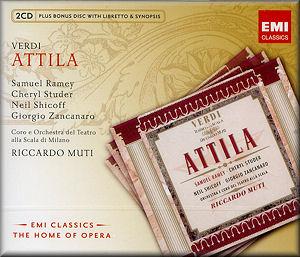 |
 |
|


alternatively
CD: Crotchet
|
Giuseppe VERDI (1813-1901)
Attila - opera in a prologue and three acts (1846)
 Attila, King of the
Huns - Samuel Ramey (bass); Ezio, a Roman general - Giorgio Zancanaro
(baritone); Odabella, daughter of the Lord of Aquileia - Cheryl
Studer
(soprano); Foresto, a knight of Aquilea - Neil Schicoff (tenor); Uldino, a young
Breton, Attila’s slave - Ernesto Gavazzi (tenor); Leone, an ancient Roman
- Giorgio Surian (bass) Attila, King of the
Huns - Samuel Ramey (bass); Ezio, a Roman general - Giorgio Zancanaro
(baritone); Odabella, daughter of the Lord of Aquileia - Cheryl
Studer
(soprano); Foresto, a knight of Aquilea - Neil Schicoff (tenor); Uldino, a young
Breton, Attila’s slave - Ernesto Gavazzi (tenor); Leone, an ancient Roman
- Giorgio Surian (bass)
Chorus and Orchestra of La Scala, Milan/Riccardo Muti
rec. Abanella, Milan, July-August 1989
 EMI CLASSICS 3091062 [76.01 + 39.50 + CD-ROM] EMI CLASSICS 3091062 [76.01 + 39.50 + CD-ROM] 
|
|
|
Premiered in 1846, when Verdi was thirty-three years old, Attila is
Verdi’s ninth opera. It appeared well into the period
following the success of his third opera, Nabucco in 1841. He called
this period his Years in the galley as, during this time,
he was constantly on the move from his base in Milan to bring
his latest opera to the stage and supervise revivals of others.
The punishing pace took its toll on his frail psyche and bodily
well-being. In 1845 he wrote My mind is always black. I must
look forward to the passing of the next three years. I must write
six operas. One of those six was Attila. It was
the first of three written under a contract with the publisher
Lucca
who retained all rights. It was the first time Verdi had written
for a publisher not a theatre. Some years later Lucca sold
the autograph to a wealthy Englishman living in Florence. It
is now
held in the British Museum and is the only Verdi autograph
not held by the Italian publisher Ricordi or the Bibliothèque
Nationale in Paris.
Based on Zacharias Werner’s play Attila, König
der Hunnen, the opera was first performed at the Teatro La
Fenice, Venice, on 17 March 1846. It follows on from the failure
of Alzira whose limitations the composer himself recognised.
Interest in Attila only waned as it was overtaken by
the popularity of the great trio of the composer’s middle
period: Rigoletto, Il
Trovatore and La Traviata.
With their rousing choruses and oppressed people, Verdi’s
early operas became associated with the Risorgimento, the battle
for the unification of the separate states of the Italian peninsula,
most of which were under foreign occupation. Certainly, when
the Roman General Ezio calls on the conquering Attila, You
may have the universe but leave Italy to me, the line
roused the contemporary population against the occupying Hapsburgs.
Verdi was certainly inspired by the story, and although there
are significant choral contributions, the librettists followed
his instructions to concentrate on the principals.
The role of the somewhat magnanimous victor, Attila, requires
a full and refulgent basso cantante voice. In the well-conducted
and recorded rival CD version on Philips (426 115-2), one of
the earliest of its early Verdi recordings, Ruggero Raimondi
sings the title role sonorously albeit with a lugubrious touch.
In this EMI reissue, Samuel Ramey’s singing is strong voiced,
well characterised and has good diction and an idiomatic feel
for a Verdian phrase. These attributes are heard to good effect
in Attila’s duet with Ezio who utters the fateful phrase Avrai
tu l’universo, Resti l’Italia a me (CD
1 tr.10). The duet between Attila and Ezio is thrilling in typical
middle period Verdian style with some rum-ti-tum music that belies
the sentiments expressed (CD 1 trs. 9-12). The Ezio of Giorgio
Zancanaro matches Ramey for vocal strength but fails to do so
in characterisation. His singing lacks any great variety of tonal
colour and is no match for that of Sherrill Milnes on the Philips
issue (CD 2 trs.1-4). As Foresto, the American Neil Schicoff
is even less of a match for the ever vocally elegant Bergonzi.
Shicoff sounds strained in places, monochromic in tone with the
tendency for an incipient bleat to protrude when the voice is
under pressure (CD 1 trs.16-19). The role of Odabella, whose
father Attila has killed and who stabs him in revenge at the
conclusion of the finale (CD 2 tr.18), needs a strong voiced
soprano with flexibility and heft as well as a wide tonal palette.
Cheryl Studer has these qualities in abundance in her outstanding
portrayal here and is a very significant plus over Cristina Deutekom
for Philips who lacks the ideal tonal weight and variety as well
as dramatic vibrancy.
Of the two conductors, both distinguished Verdians, Muti is strict
in adhering to the score and is intensely dramatic whilst Gardelli
for Philips is better balanced in his treatment of the more lyric
moments. The idiomatic chorus of La Scala, whose Italian squilla is
a big plus, aids Muti in his realisation of the work. However,
the added clarity of the digital recording is somewhat marred
by the rather forward placing of the soloists which adds a hardness
that the analogue recording of Philips avoids. That being said,
the Abanella is far preferable as a recording venue to La Scala
whose acoustics have defeated many recording engineers.
Robert J Farr
|
|















